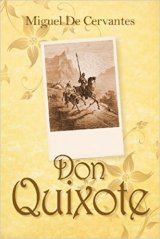Don Quixote Page #6
The Ingenious Nobleman Sir Quixote of La Mancha, or just Don Quixote, is a Spanish novel by Miguel de Cervantes.
Having thus, with hot haste and speed, brought to a conclusion these never-till-now-seen ceremonies, Don Quixote was on thorns until he saw himself on horseback sallying forth in quest of adventures; and saddling Rocinante at once he mounted, and embracing his host, as he returned thanks for his kindness in knighting him, he addressed him in language so extraordinary that it is impossible to convey an idea of it or report it. The landlord, to get him out of the inn, replied with no less rhetoric though with shorter words, and without calling upon him to pay the reckoning let him go with a Godspeed. CHAPTER IV. OF WHAT HAPPENED TO OUR KNIGHT WHEN HE LEFT THE INN Day was dawning when Don Quixote quitted the inn, so happy, so gay, so exhilarated at finding himself now dubbed a knight, that his joy was like to burst his horse-girths. However, recalling the advice of his host as to the requisites he ought to carry with him, especially that referring to money and shirts, he determined to go home and provide himself with all, and also with a squire, for he reckoned upon securing a farm-labourer, a neighbour of his, a poor man with a family, but very well qualified for the office of squire to a knight. With this object he turned his horse's head towards his village, and Rocinante, thus reminded of his old quarters, stepped out so briskly that he hardly seemed to tread the earth. He had not gone far, when out of a thicket on his right there seemed to come feeble cries as of some one in distress, and the instant he heard them he exclaimed, "Thanks be to heaven for the favour it accords me, that it so soon offers me an opportunity of fulfilling the obligation I have undertaken, and gathering the fruit of my ambition. These cries, no doubt, come from some man or woman in want of help, and needing my aid and protection;" and wheeling, he turned Rocinante in the direction whence the cries seemed to proceed. He had gone but a few paces into the wood, when he saw a mare tied to an oak, and tied to another, and stripped from the waist upwards, a youth of about fifteen years of age, from whom the cries came. Nor were they without cause, for a lusty farmer was flogging him with a belt and following up every blow with scoldings and commands, repeating, "Your mouth shut and your eyes open!" while the youth made answer, "I won't do it again, master mine; by God's passion I won't do it again, and I'll take more care of the flock another time." Seeing what was going on, Don Quixote said in an angry voice, "Discourteous knight, it ill becomes you to assail one who cannot defend himself; mount your steed and take your lance" (for there was a lance leaning against the oak to which the mare was tied), "and I will make you know that you are behaving as a coward." The farmer, seeing before him this figure in full armour brandishing a lance over his head, gave himself up for dead, and made answer meekly, "Sir Knight, this youth that I am chastising is my servant, employed by me to watch a flock of sheep that I have hard by, and he is so careless that I lose one every day, and when I punish him for his carelessness and knavery he says I do it out of niggardliness, to escape paying him the wages I owe him, and before God, and on my soul, he lies." "Lies before me, base clown!" said Don Quixote. "By the sun that shines on us I have a mind to run you through with this lance. Pay him at once without another word; if not, by the God that rules us I will make an end of you, and annihilate you on the spot; release him instantly." The farmer hung his head, and without a word untied his servant, of whom Don Quixote asked how much his master owed him. He replied, nine months at seven reals a month. Don Quixote added it up, found that it came to sixty-three reals, and told the farmer to pay it down immediately, if he did not want to die for it. The trembling clown replied that as he lived and by the oath he had sworn (though he had not sworn any) it was not so much; for there were to be taken into account and deducted three pairs of shoes he had given him, and a real for two blood-lettings when he was sick. "All that is very well," said Don Quixote; "but let the shoes and the blood-lettings stand as a setoff against the blows you have given him without any cause; for if he spoiled the leather of the shoes you paid for, you have damaged that of his body, and if the barber took blood from him when he was sick, you have drawn it when he was sound; so on that score he owes you nothing." "The difficulty is, Sir Knight, that I have no money here; let Andres come home with me, and I will pay him all, real by real." "I go with him!" said the youth. "Nay, God forbid! No, senor, not for the world; for once alone with me, he would ray me like a Saint Bartholomew." "He will do nothing of the kind," said Don Quixote; "I have only to command, and he will obey me; and as he has sworn to me by the order of knighthood which he has received, I leave him free, and I guarantee the payment." "Consider what you are saying, senor," said the youth; "this master of mine is not a knight, nor has he received any order of knighthood; for he is Juan Haldudo the Rich, of Quintanar."
Translation
Translate and read this book in other languages:
Select another language:
- - Select -
- 简体中文 (Chinese - Simplified)
- 繁體中文 (Chinese - Traditional)
- Español (Spanish)
- Esperanto (Esperanto)
- 日本語 (Japanese)
- Português (Portuguese)
- Deutsch (German)
- العربية (Arabic)
- Français (French)
- Русский (Russian)
- ಕನ್ನಡ (Kannada)
- 한국어 (Korean)
- עברית (Hebrew)
- Gaeilge (Irish)
- Українська (Ukrainian)
- اردو (Urdu)
- Magyar (Hungarian)
- मानक हिन्दी (Hindi)
- Indonesia (Indonesian)
- Italiano (Italian)
- தமிழ் (Tamil)
- Türkçe (Turkish)
- తెలుగు (Telugu)
- ภาษาไทย (Thai)
- Tiếng Việt (Vietnamese)
- Čeština (Czech)
- Polski (Polish)
- Bahasa Indonesia (Indonesian)
- Românește (Romanian)
- Nederlands (Dutch)
- Ελληνικά (Greek)
- Latinum (Latin)
- Svenska (Swedish)
- Dansk (Danish)
- Suomi (Finnish)
- فارسی (Persian)
- ייִדיש (Yiddish)
- հայերեն (Armenian)
- Norsk (Norwegian)
- English (English)
Citation
Use the citation below to add this book to your bibliography:
Style:MLAChicagoAPA
"Don Quixote Books." Literature.com. STANDS4 LLC, 2025. Web. 5 Feb. 2025. <https://www.literature.com/book/don_quixote_27>.








Discuss this Don Quixote book with the community:
Report Comment
We're doing our best to make sure our content is useful, accurate and safe.
If by any chance you spot an inappropriate comment while navigating through our website please use this form to let us know, and we'll take care of it shortly.
Attachment
You need to be logged in to favorite.
Log In